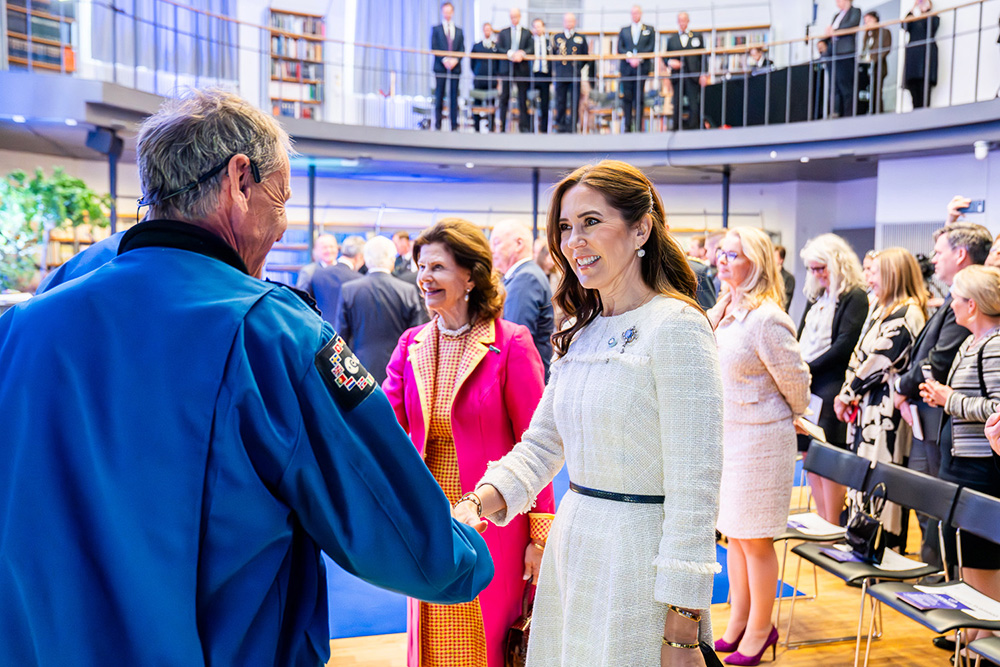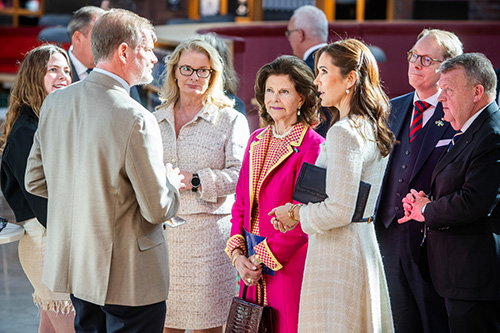Space takes centre stage during Danish state visit

The Swedish and Danish royal couples were given an insight into KTH's research in space technology and sustainable development during a visit yesterday to KTH Royal Institute of Technology.
“The visit can be seen as a measure of KTH's importance for the development of society in Sweden, and of our countries’ common interests in the research areas,” said Anders Söderholm, president of KTH.
Around 60 people accompanied the royal couples, King Carl XVI Gustaf and Queen Silvia of Sweden and King Frederik X and Queen Mary of Denmark, to attend a specially-organised seminar in the KTH Library on space technology and sustainable transformation.

Joining the royal delegations were Sweden’s Minister for Schools Lotta Edholm and Minister for Foreign Affairs Tobias Billström, and Denmark’s Minister for Foreign Affairs Lars Løkke Rasmussen. All three ministers delivered remarks to open the event, which was part of the Danish royal couple's two-day state visit to Sweden.
“It was especially nice that we were able to showcase and demonstrate both research environments and concrete innovations in the field,” Söderholm said.
Söderholm’s opening remarks offered an account of the development of engineering sciences at KTH since its main campus was opened in the early 1900s. He also described some highlights of future technology areas such as energy storage, AI, digitalisation and life sciences, and concluded by welcoming the royal couples to the “KTH factory of the future”.
Edholm said space exploration is an important example of the free pursuit of knowledge and its role in academia. She said space research impacts positively in a number of areas, including the green transition, the security sector and the strengthening of interest in science among children and young people.
Developing space research
After an introduction by Christer Fuglesang , astronaut and professor of spaceflight, and Yifang Ban, professor of geoinformatics, the programme included a panel discussion. Three astronauts discussed the role of space technology for a sustainable future. In addition to Fuglesang, fellow astronauts Marcus Wandt and their Danish colleague Andreas Mogensen also spoke.

One question was about what is most likely to further develop space research. Fuglesang pointed to the rapid development of spacecraft. “The costs have already decreased tenfold and with the potential to decrease considerably more, which would open up completely new opportunities to explore space,” he said.
Using AI and machine learning on satellites will also bring huge benefits, he said.
Wandt highlighted the special energy and passion that he said exists among many researchers, innovators and problem solvers in space technology, which can benefit society at large.
“If you hit an obstacle, you don't give up, you keep going, and you use your evenings and weekends to achieve success. Eventually you will reach your goal and you can also benefit from the innovations made along the way in other areas such as technology for sustainability. This is a very powerful tool.”
Exhibition on green technology
After the panel discussion, the two royal couples, accompanied by KTH's president and Deputy President Mikael Lindström, moved to a separate part of the library to view an exhibition of six start-up companies based on research and developing technology for a green transition. All with potential for use in space and all supported by KTH Innovation.
At a stand that attracted the attention of the royal couples was Jan Jäderberg, one of the founders of Novatron, which develops technology for fusion power. A test facility is now being built at KTH to validate the technology, with the aim of supplying electricity to the grid by 2040.
“It's great to be able to stand here and have the opportunity to get a message out about sustainable technology. Our ambition and hope is to make fusion a global and dominant energy source,” he said.
Other start-ups included innovations ranging from wireless communications and sustainable biomaterials to energy storage and reducing methane emissions from cows.
Text: Christer Gummeson (
gummeson@kth.se
)
Photo: Magnus Glans

